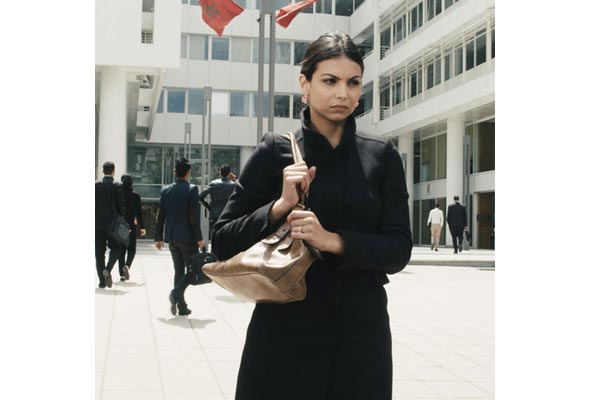
Kolkata, Nov 16 (IBNS): The Cinema of Morocco which features under the section Contemporary Moroccan Cinema has proved to be perhaps the biggest draw of the 23rd Kolkata International Film Festival (KIFF) at Nandan 2.
However, the downside of this very carefully curated and wonderful programme with a bouquet of six full-length feature films is that the comparatively limited capacity of the theatre could hardly accommodate even a quarter of the people waiting in the serpentine queues outside every day for hours into the theatre. Even foreign delegates had to either sit on the floor or walk away sadly.
The “contemporary” part covers films released between 2010 and 2017 by noted filmmakers of Morocco. The films are – Forgotten (2010) directed by Hassan Ben Jalloun, The 5th String (2011) by Selma Bargach, Androman…Blood and Coal (2012) by Azlarabe Alaoul, Zero (2012) by Nour Eddine Lakhmari, Behind Closed Door (2013) by Mohamed Bensouda and Razzia (2017) by Nabil Ayouch.
It has been tough for authentic Moroccan cinema to come out of its French influence where famous French filmmakers would use Morocco just as a place setting for their films without probing into the socio-political and economic issues the local people needed to grapple with on a day-to-day basis.
At a Press Conference organized during the festival, Noor Lakhmari, director of Zero, said, “Thankfully, Morocco has been able to come out of the influence of French morality and now Moroccans are making films in all regional languages like Arabic, Darija, Berber and even Hebrew.” Lakhmari drew an analogy between the present state of Moroccan cinema ad the Italian neorealist cinema since the Moroccans were trying to liberate themselves ad do something new.
During the beginning of Moroccan cinema, there were only two women directors. Now, there are 83 working women directors in the Moroccan film industry. Salma Bargach, whose film The 5th String was screened at the festival, said that though conservative society does not put men and women at par, the fact remains that men and women in the industry now work in a spirit of equality and friendship.
The situation in exploring subjects concerning women has changed considerably over the past two years. In 2015, due to the government ban imposed on Nabil Ayouch’s prostitution drama Much Loved one week after the film bowed in Directors’ Fortnight at Cannes. But the controversy soon faded away purely because of the merits of the film itself and was transformed into a heated debate about the state of Moroccan culture.
The present selection has at least shows quite an emphasis on gender and how women are made to suffer just because they are women. One example is Behind Closed Doors. It is about a working woman, married and with a child, is constantly harassed sexually by the director of the company. When she is persistent in her refusal to compromise, he decides to take revenge.
Androman – Blood and Coal is about a rustic coal miner who fails to beget a male heir who would inherit his coal mines, decides to turn his eldest daughter into a boy, Androman. Androman however, revives the mutations of his adolescent body and the feminine attitudes that betrays his false mascline appearance. What happens when this forced to be a boy falls in love? This has very clear echoes of Anup Singh’s Hindi film Quissa released a couple of years ago.
(Reported by Shoma A. Chatterji)
Support Our Journalism
We cannot do without you.. your contribution supports unbiased journalism
IBNS is not driven by any ism- not wokeism, not racism, not skewed secularism, not hyper right-wing or left liberal ideals, nor by any hardline religious beliefs or hyper nationalism. We want to serve you good old objective news, as they are. We do not judge or preach. We let people decide for themselves. We only try to present factual and well-sourced news.






